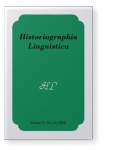Vol. 11:1/2 (1984) ► pp.263–286
Conocimiento, Lenguaje Y Gramatica En La Obra De Andrés Bello (1781–1865)
Andrés Bello (1781–1865) is the most important Spanish grammarian of the 19th century. In his work, he attempts to apply a scientific objectivity, free from any dogmatism, to the study of language and social reality with a view to improving man and his community: Social progress, and not simply individual progress, is one of the driving ideas of his work. In linguistics, the source of his inspiration was general grammar, both synchronic and pedagogical. His work reaches its crowning in his Grammar of the Castillian Language for the use of Spanish-Americans of 1847. In his conception, it is the goal of norms and of the respect of usage that they determine to continually remind the community of speakers of a particular behaviour in order to avoid the bad consequences of a cultural and linguistic disruption. It is in the light of earlier considerations that Andrés Bello brings to bear all his concern for the preservation of the Spanish cultural heritage, in particular the common language as an instrument of communication and integration, and as the repository capitalizing on the cultural language. In this way, he appears to us, apart from his eminent position of renewer of the study of Spanish grammar, as the initiator of the immense task which consists of the development of a socio-cultural and linguistic variant within the Spanish unity. He thus contributed, in a decisive manner, to the formation of an Spanish-American man who is conscious of his tradition and his historical place in the world.
Article language: Spanish
